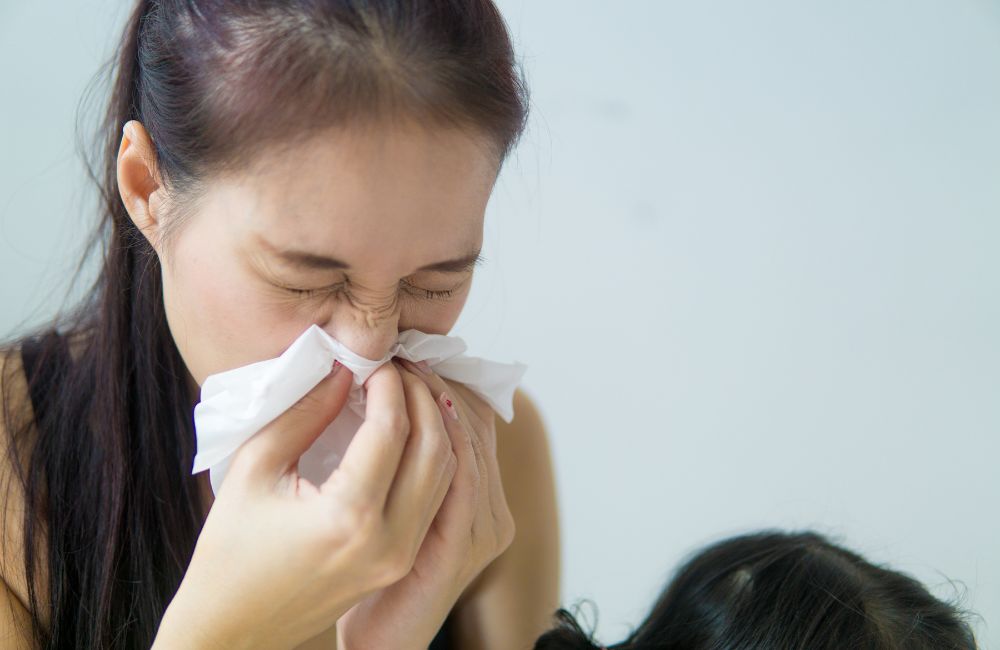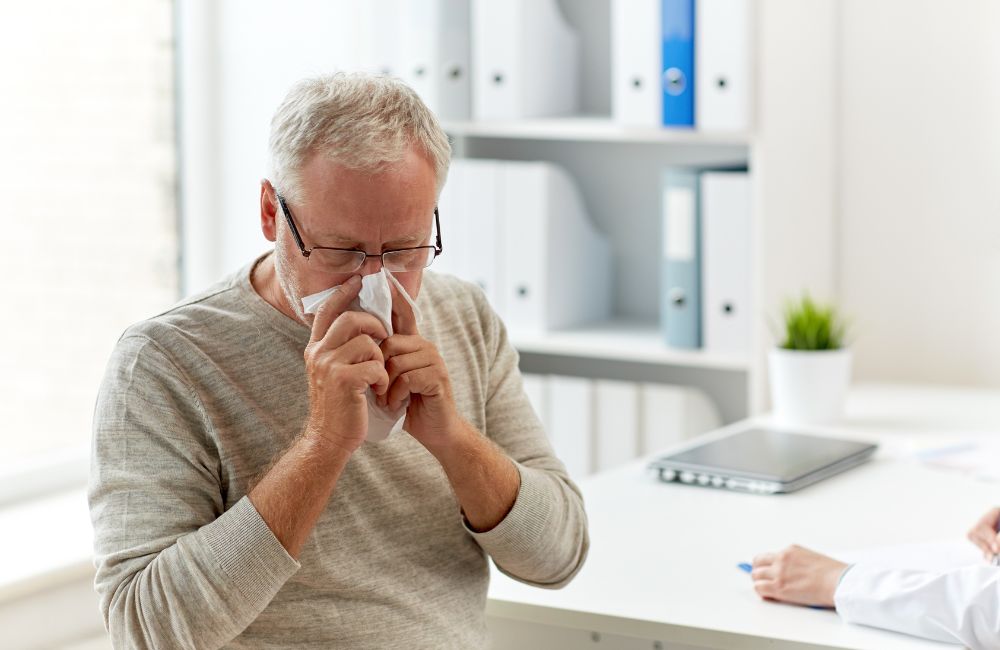
Navigating the challenges of Allergic Rhinitis requires a comprehensive understanding of its symptoms and treatment options and recognizing the right time to seek urgent care in West Hartford, CT. Staying informed about managing allergic rhinitis is essential for their well-being. Join us in exploring hay fever’s fundamental aspects, ensuring you have the knowledge to make informed decisions and access timely and effective healthcare.
Key Takeaways
What is Allergic Rhinitis
What Causes Allergic Rhinitis
Common Symptoms of Allergic Rhinitis
When Should We Seek Urgent Care in West Hartford, CT, For Hay Fever?
Treatment Options for Allergic Rhinitis
Managing and Preventing Allergic Rhinitis
Frequently Asked Questions
Take Control of Your Allergic Rhinitis Today!
✔ Identifying and avoiding allergens is crucial in preventing hay fever symptoms.
✔ Early recognition of hay fever symptoms facilitates effective management and relief.
✔ A personalized hay fever action plan can significantly enhance daily coping strategies.
✔ Recognizing when urgent care is necessary becomes pivotal during severe hay fever episodes.
✔ Consistent adherence to prescribed treatments and lifestyle adjustments can significantly improve the quality of life for individuals grappling with hay fever.

Allergic rhinitis, commonly referred to as hay fever, is a response to airborne allergens. Inhalation of these tiny particles via the nose or mouth triggers your immune system to release histamine, a natural chemical. Contrary to its name, hay fever is neither caused by hay nor does it typically result in a fever.
Hay fever’s symptoms include sneezing, a stuffy or runny nose, and irritation of the nose, throat, mouth, and eyes. It’s important to differentiate allergic rhinitis from infectious rhinitis, such as the common cold; hay fever is not infectious. Furthermore, not all forms of rhinitis are due to allergies. Nonallergic rhinitis, which leads to similar symptoms, is caused by inflammation rather than an allergic reaction to allergens or histamine release.
Allergic rhinitis impacts both developed and developing nations, affecting over 400 million individuals worldwide, with prevalence rates ranging from 10% to 30% in adults and exceeding 40% in children.
Allergic rhinitis, or hay fever, develops when the immune system overreacts to airborne irritants, known as allergens. These minuscule allergens can be easily inhaled through the nose or mouth.
For most individuals, allergens pose no threat. However, the immune system perceives these allergens as hostile invaders in hay fever patients. To defend the body, it releases various natural chemicals into the bloodstream, histamine being the predominant one. Histamine leads to inflammation and itchiness in the nose, eyes, and throat mucous membranes as the body attempts to remove the allergen.
Several allergens are known to cause allergic rhinitis, including:
In addition, food allergies can trigger inflammation in the nose and throat, simulating symptoms similar to those of allergic rhinitis. Given that food allergies can be severe and potentially fatal, immediate medical consultation is advised if you suspect that a specific food consistently provokes allergic symptoms.
Environmental allergens, like childhood asthma, frequently trigger allergic rhinitis in children. Parents and caregivers must identify and manage these triggers and have a clear plan for seeking urgent care in West Hartford, CT.
For adults, the onset of allergic Rhinitis may be influenced by a broader range of factors, including stress, lifestyle changes, and exposure to various irritants. Recognizing the need for urgent care in West Hartford, CT, remains crucial, especially during severe episodes, even as adults navigate potential challenges like delayed diagnosis and coexisting health issues.
Allergic rhinitis is a prevalent allergic condition affecting nasal passages. Recognizing the symptoms is crucial for effective management, and understanding when to seek urgent care in West Hartford, CT, is essential.
Here are the common symptoms of allergic rhinitis to be aware of:
Sneezing, a hallmark of allergic rhinitis, occurs frequently in uncontrollable bouts triggered by allergens like pollen. Its repetitive nature can disrupt daily life, underlining the need for symptom management, including seeking prompt care at an urgent care in West Hartford, CT.
Allergic rhinitis often causes a bothersome runny or stuffy nose. Accompanied by clear nasal discharge and congestion, it impedes comfortable breathing through the nose, necessitating relief measures and, if necessary, a visit to urgent care in West Hartford, CT.
The condition commonly afflicts the eyes, leading to itching, redness, and excessive tearing. These eye symptoms frequently coincide with nasal issues, intensifying overall discomfort and necessitating attention, including consultation with urgent care in West Hartford, CT.
Some individuals with allergic rhinitis may experience bothersome itching in the throat or ears. These sensations can be irritating and may result in coughing or frequent throat clearing, prompting them to seek relief at urgent care in West Hartford, CT.
Allergic rhinitis, similar to asthma, can cause fatigue. Constant nasal symptoms and potential sleep disturbances due to congestion contribute to daytime tiredness, which impacts daily functioning and potentially requires assessment at urgent care in West Hartford, CT.
Though often considered a common allergic condition, allergic rhinitis may sometimes warrant urgent medical attention. While routine management and monitoring by a healthcare provider are essential, recognizing specific symptoms can help individuals determine when to seek urgent care in West Hartford, CT.
Here are the signs and symptoms indicating the need for immediate attention at trusted urgent care in West Hartford, CT:
In escalating allergic rhinitis symptoms into a severe allergic reaction, seeking immediate attention at a trusted urgent care center in West Hartford, CT is crucial. Such reactions can be life-threatening and require prompt medical intervention.
While over-the-counter antihistamines are common for managing allergic rhinitis, it is advisable to visit an urgent care facility in West Hartford, CT, if they prove ineffective in alleviating symptoms. Medical professionals from reputable urgent care can provide alternative treatments and evaluate the situation.
While occasional nosebleeds may occur with allergic rhinitis, persistent or severe nosebleeds warrant attention at urgent care in West Hartford, CT. Such occurrences could signal underlying issues that need evaluation by healthcare experts.
Allergic rhinitis can affect the eyes, and urgent care intervention is essential if symptoms progress to impaired vision, severe eye pain, or significant eye-light changes. This ensures a thorough evaluation to rule out more serious complications.
For individuals dealing with both allergic rhinitis and asthma, worsening asthma symptoms during allergic rhinitis flare-ups require immediate attention at an urgent care in West Hartford, CT. A noticeable decline in respiratory function or increased breathing difficulties necessitates prompt medical assessment.
While fatigue is common in allergic rhinitis, constant and overwhelming fatigue or weakness may indicate an underlying issue that needs urgent evaluation by medical professionals at urgent care in West Hartford, CT.
The presence of fever and severe sinus pain may suggest a secondary infection. Seeking care at urgent care in West Hartford, CT ensures timely assessment and appropriate treatment for potential complications.
A sudden and rapid onset of severe allergic rhinitis symptoms, even if initially mild, should not be ignored. Immediate attention at reliable urgent care in West Hartford, CT is crucial to address the potential for rapid deterioration and ensure swift medical intervention.
Allergic rhinitis can disrupt daily life, but it is possible with various treatment strategies. Whether you’re dealing with seasonal allergies or year-round sensitivities, understanding your options is the first step toward relief.
Antihistamines play a crucial role in allergic rhinitis treatment by blocking histamine’s action, which is responsible for many allergy symptoms. These medications can alleviate sneezing, itching, and runny nose and are available as both over-the-counter and prescription options. For quick access to these medications, urgent care in West Hartford, CT, can provide immediate assistance.
Nasal corticosteroids are key for reducing inflammation within the nasal passages, effectively addressing nasal congestion, itching, and sneezing. These sprays are suitable for long-term management and are accessible over-the-counter and by prescription. In cases where symptoms flare up unexpectedly, visiting an urgent care in West Hartford, CT, can help you find the right nasal corticosteroid.
Decongestants offer relief by narrowing the blood vessels in nasal tissues, thereby reducing swelling and congestion. However, caution is advised with nasal sprays due to the risk of rebound congestion with prolonged use. Mast cell stabilizers and leukotriene modifiers provide additional pathways to manage allergic rhinitis, targeting the underlying causes of allergy symptoms.
For a comprehensive approach, combination medications that unite antihistamines and decongestants can tackle multiple symptoms at once. These are particularly useful for individuals seeking broad-spectrum relief.
Immunotherapy, particularly through allergy shots from reliable urgent care in West Hartford, CT, presents a strategic long-term approach to managing allergic rhinitis by methodically desensitizing the body’s immune system to particular allergens. This treatment is most effective for individuals who have clearly identified allergens that trigger their symptoms. The process involves administering gradually increasing doses of the allergen in question, over a period that typically spans several years.
This gradual increase helps the immune system become less sensitive to the allergen over time, effectively reducing the severity of allergic reactions or potentially leading to the complete cessation of symptoms. Immunotherapy can significantly improve the quality of life for allergic rhinitis sufferers by targeting the root cause of allergic reactions rather than merely treating the symptoms. It’s a tailored approach, requiring a detailed assessment by a professional allergist like those from DOCS Urgent Care – West Hartford to ensure suitability and to tailor the treatment to the specific allergens causing issues for the patient.

Effectively managing and preventing allergic rhinitis involves proactive strategies to minimize symptoms and enhance overall well-being. By incorporating these practical tips into your daily life, you may reduce the impact of allergic rhinitis:
1. Maintain a Symptom Journal: Record potential triggers such as pollen, dust, pet dander, or specific environmental factors. This information can help you better understand and manage your allergic rhinitis.
2. Stay Informed About Pollen Levels: Check daily pollen forecasts and stay indoors on high pollen days. Limiting outdoor activities during periods of poor air quality can significantly reduce exposure to allergens.
3. Invest in Allergen-Proof Measures: Use allergen-proof covers on pillows and mattresses to protect against dust mites. Regularly washing bedding in hot water can also help control allergens.
Work closely with your doctor to develop a personalized allergy management plan. Follow the plan consistently and attend regular check-ups to monitor and adjust your strategies.
Adhere to your prescribed allergy medications, especially long-term control options, even when symptoms are not severe. Consistent medication use can prevent symptom escalation.
Always have your prescribed quick-relief medications, such as antihistamines or nasal sprays, readily available to address acute symptoms promptly.
Use dehumidifiers if necessary to reduce indoor humidity levels and prevent mold growth, a common trigger for allergic rhinitis.
Stay updated on recommended vaccinations, including the annual flu shot, to reduce the risk of respiratory infections triggering allergic rhinitis symptoms.
Learn and practice relaxation techniques such as yoga or meditation to manage stress, a potential trigger for allergic rhinitis.
Regularly monitor your respiratory health using peak flow meters. These devices can help detect early decreases in lung function before symptoms become apparent.

Allergic rhinitis often exhibits a seasonal pattern. The symptoms tend to worsen during specific times of the year when certain airborne allergens are prevalent. For instance, tree pollen is a common trigger in the spring, grass pollen in late spring and early summer, and weed pollen in late summer and fall. Understanding these seasonal variations can help individuals anticipate and manage their hay fever symptoms more effectively.
Allergic rhinitis and non-allergic rhinitis share similar symptoms, such as nasal congestion and sneezing, but they differ in their underlying causes. An immune response to allergens like pollen, pet dander, or mold triggers allergic rhinitis. In contrast, non-allergic rhinitis is often caused by irritants such as smoke, pollution, changes in temperature, or certain medications. Distinguishing between the two is crucial for appropriate treatment and management strategies.
Allergic rhinitis can significantly impact sleep quality. Nasal congestion, sneezing, and itching can disrupt standard sleep patterns, leading to difficulty falling asleep and frequent awakenings at night. Sleep deprivation may contribute to daytime fatigue, irritability, and decreased well-being. Addressing hay fever symptoms through appropriate treatments can help improve sleep and overall quality of life.
While allergy medications can provide effective relief, long-term use of certain medications may have potential side effects. For example, if used excessively, nasal decongestant sprays can lead to rebound congestion. It’s essential to use these medications under the guidance of a healthcare professional from urgent care in West Hartford, CT, to minimize the risk of complications and explore alternative treatments if necessary.
Allergic rhinitis and food allergies are related because both involve an immune system response. However, they are distinct conditions with different triggers. Cross-reactivity is possible, meaning individuals with hay fever may experience oral allergy syndrome, where certain fruits or vegetables provoke mild allergic reactions due to similarities between proteins in these foods and allergens causing hay fever.

Effectively navigating the complexities of allergic rhinitis requires a vigilant understanding of your specific triggers and a proactive approach to managing symptoms. By implementing the preventive strategies outlined here, you can aspire to maintain a vibrant and uninterrupted lifestyle, minimizing the impact of allergic rhinitis.
For residents in and around West Hartford, CT, proactive care is your strongest ally in managing allergic rhinitis. When professional intervention is needed, consider contacting an esteemed urgent care provider in West Hartford, CT, such as DOCS Urgent Care. Our services are readily available to provide the support and care necessary to manage allergic rhinitis symptoms effectively.



During this surge in COVID-19 cases, our primary focus is meeting the high demand for tests, and we are seeing higher than usual wait times. This means we are unable to answer most phone calls. Please know that our teams are working very hard during this time to care for as many patients as safely as possible. Please click the button below for answers to common questions. We appreciate your understanding.